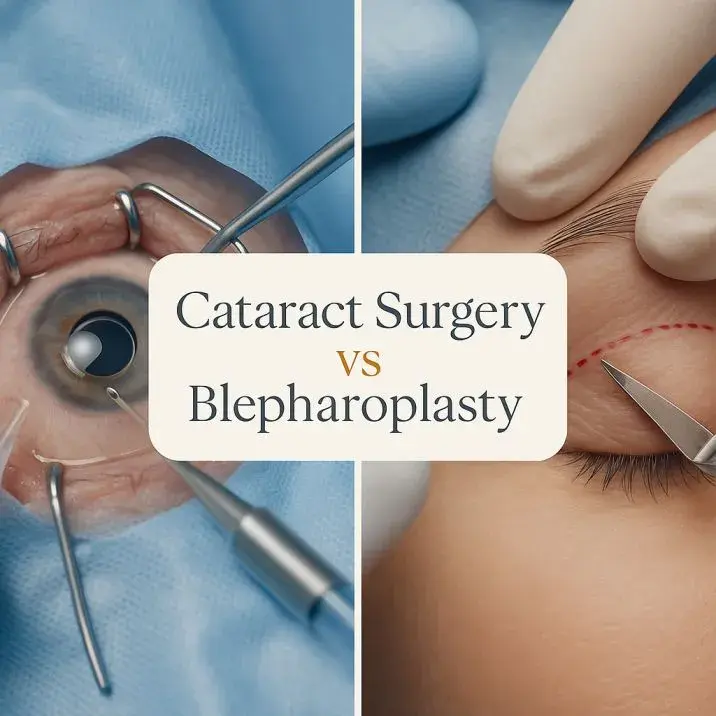Lower Eyelid Retraction Repair: Causes, Symptoms, and Treatment Options
- Eyes Defined

- Feb 8, 2022
- 4 min read
Updated: Feb 6, 2025

Lower eyelid retraction exposes more of the eye, causing discomfort and aesthetic concerns. Learn about its causes, symptoms, and effective treatment options—both surgical and non-surgical—to restore comfort and appearance.
Causes of Eyelid Retraction
Eyelid retraction can result from several underlying issues, including:
Trauma: Physical injury to the eye or surrounding tissues.
Surgical Complications: Issues following eyelid surgeries like blepharoplasty.
Thyroid Eye Disease (Graves’ Disease): A common cause linked to inflammation and tissue changes.
Tumors: Growths near the eyelid affecting its positioning.
Neurological Conditions: Such as Parkinson's disease or facial nerve palsy.
Infections: Including herpes zoster.
Radiation Therapy: Used in cancer treatments.
Prolonged Contact Lens Use: Leading to structural changes over time.
Symptoms of Eyelid Retraction
Eyelid retraction can cause both physical discomfort and aesthetic issues. Symptoms include:
Dryness and irritation of the eyes.
Pain or redness.
Swelling of the conjunctiva (the layer over the white of the eye).
A “wide-eyed” appearance that may feel unnatural.
Treatment Options for Eyelid Retraction
Conservative ApproachesInitial treatments aim to manage symptoms and avoid surgery when possible:
Massage Therapy: Gentle massage to improve tissue flexibility.
Artificial Tears and Ointments: To keep the eye lubricated and reduce irritation.
Surgical SolutionsFor more severe cases, surgery may be necessary to restore the eyelid’s natural position:
Grafting Techniques: Including hard palate grafts, free tarsal grafts, or spacer grafts to reposition the eyelid.
Tightening Procedures: For minimal retraction (2 mm or less), eyelid tightening may suffice.
Lower Eyelid Retraction and Thyroid Eye Disease
Thyroid eye disease often leads to lower eyelid retraction due to inflammation and fibrosis. These changes can cause tissue loss, requiring tailored treatment strategies.
Can Eyelid Retraction Resolve on Its Own?
In some cases, eyelid retraction may improve with time, particularly if caused by temporary conditions. However, persistent or worsening retraction often necessitates medical or surgical intervention.
Cost of Lower Eyelid Retraction Surgery
The cost of surgery typically starts at £3,000 and varies based on factors such as:
Whether general anesthesia is needed.
The type of spacer graft used.
Whether one or both eyes are treated.
Private medical insurance may cover the procedure, depending on the cause and your policy terms.
Post-Surgery Expectations
Most patients can go home the same day after surgery. Recovery involves minimal pain, slight discomfort, and wearing an eye patch for 1–2 days. Heavy lifting should be avoided for two weeks to ensure proper healing.
Lower Eyelid Retraction After Blepharoplasty
In some cases, lower eyelid retraction may occur after blepharoplasty due to:
Excessive removal of eyelid skin.
Tension from fibroblast activity during healing.
Non-Surgical Treatments for Lower Eyelid Retraction
For mild cases (retraction of 2 mm or less), non-surgical options may help:
Massage Therapy: Regular upward massage for two or more months.
Filler Injections: With scar-modulating agents to restore volume and improve appearance. Multiple sessions may be required.
Severe cases generally require surgical correction for optimal results.
Key Takeaways
Eyelid retraction occurs when the eyelid pulls away from the eyeball, often caused by trauma, surgery complications, or thyroid eye disease.
Symptoms include dryness, irritation, and redness, along with a wide-eyed appearance.
Non-surgical treatments like massage and artificial tears can help mild cases, but severe retraction may require surgery.
Surgery costs start at £3,000, depending on factors like anesthesia and grafting requirements.
Recovery is typically quick, with most patients resuming daily activities within a few weeks.
FAQs
What is lower eyelid retraction?
Lower eyelid retraction is a condition where the lower eyelid pulls downward, exposing more of the eyeball than normal. It can cause discomfort, dryness, and an unnatural wide-eyed appearance.
Why does lower eyelid retraction happen?
Lower eyelid retraction can be caused by trauma, thyroid eye disease, previous eyelid surgery complications, infections, or prolonged contact lens use.
Who is at risk for lower eyelid retraction?
People with thyroid eye disease, those who have had eyelid surgery, individuals with facial nerve disorders, and those with a history of eye trauma are at higher risk.
Where can I get lower eyelid retraction surgery in the UK?
Lower eyelid retraction surgery is available at private clinics and specialist eye hospitals across the UK. Consult an oculoplastic surgeon for the best treatment options.
How is lower eyelid retraction diagnosed?
An ophthalmologist or oculoplastic surgeon diagnoses eyelid retraction through an eye exam, measuring eyelid position and assessing symptoms like dryness and irritation.
Will lower eyelid retraction improve without surgery?
Mild cases may improve with massage, artificial tears, or filler injections. Severe cases usually require surgery to restore the eyelid’s normal position.
What are the symptoms of lower eyelid retraction?
Symptoms include excessive eye exposure, dryness, irritation, redness, pain, and an unnatural, wide-eyed appearance.
Why does thyroid eye disease cause eyelid retraction?
Thyroid eye disease leads to inflammation and fibrosis, which tighten the eyelid tissues, pulling them downward.
How much does lower eyelid retraction surgery cost in the UK?
Surgery costs start at £3,000 but vary based on the complexity, type of graft used, and whether one or both eyelids are treated.
What are the non-surgical treatments for lower eyelid retraction?
Non-surgical options include massage therapy, artificial tears, and filler injections to improve eyelid position and reduce symptoms.
If you’re experiencing eyelid retraction symptoms, don’t wait to seek help. Schedule a consultation with our expert team today to explore the best treatment options for you. Restore comfort and confidence with professional care.




Comments